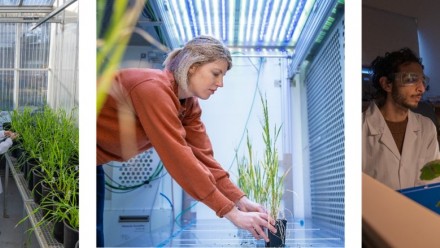Plant Biology Seminar Series
Seminars from the RSB Division of Plant Sciences.
17
Jul
2024
12pm 17 July 2024
Prof Dani Way, Director, Dr Richard Poire, Manager, Dr Frederike Stock, Project Lead, Dr Tao Hu, Software Engineer
The Australian Plant Phenomics Network (APPN, formerly known as APPF) is comprised of nine institutions offering controlled-environment phenotyping facilities, mobile phenotyping units, and field sites strategically spread across Australia’s diverse climate zones.
PS Seminar Series: The Australian Plant Phenomics Network – your partner for Plant Phenotyping
The Australian Plant Phenomics Network (APPN, formerly known as APPF) is comprised of nine institutions offering controlled-environment phenotyping facilities, mobile phenotyping units, and field sites strategically spread across Australia’s diverse climate zones. . More information here: https://biology.anu.edu.au/news-events/events/ps-seminar-series-australian-plant-phenomics-network-%E2%80%93-your-partner-plant
2024-07-17 02:00:00Z
2024-07-17 02:00:00Z
Eucalyptus Seminar Room,
S205, Level 2,
RN Robertson Building (46)
24
Jul
2024
12pm 24 July 2024
Dr James P B Lloyd, Plant Energy Biology ARC CoE and Plants for Space ARC CoE, University of Western Australia
Plant carbon fixation, a vital process for capturing energy, profoundly influences various aspects of our lives, including food, clothing fibers, medicines, building materials, and even the production of human therapeutics.
PS Seminar Series - Harnessing synthetic gene circuits for customized gene expression patterns
Plant carbon fixation, a vital process for capturing energy, profoundly influences various aspects of our lives, including food, clothing fibers, medicines, building materials, and even the production of human therapeutics. . More information here: https://biology.anu.edu.au/news-events/events/ps-seminar-series-harnessing-synthetic-gene-circuits-customized-gene-expression
2024-07-24 02:00:00Z
2024-07-24 02:00:00Z
Please note: this seminar will be held in the Eucalyptus Seminar Room and via Zoom, details are included below.
Eucalyptus Seminar Room,
S205, Level 2,
RN Robertson Building (46)
Please click the link below to join the webinar:
https://anu.zoom.us/j/83142299928?pwd=4dHP2CokZwZjs3bHR5U71snel2GV2E.1
Passcode: 764320
Canberra time: please check your local time & date if you are watching from elsewhere.
26
Jul
2024
3.30pm 26 July 2024
Dr Selene L. Fernandez-Valverde, RNA Institute, School of Biotechnology & Biomolecular Sciences, UNSW Sydney
Long non-coding RNAs (lncRNAs) have recently emerged as prominent elements of the regulatory transactions of eukaryotic genomes.
PS Seminar Series - Evolution as a lens into lncRNA functionality
Long non-coding RNAs (lncRNAs) have recently emerged as prominent elements of the regulatory transactions of eukaryotic genomes.. More information here: https://biology.anu.edu.au/news-events/events/ps-seminar-series-evolution-lens-lncrna-functionality
2024-07-26 05:30:00Z
2024-07-26 05:30:00Z
Eucalyptus Seminar Room,
S205, Level 2,
RN Robertson Building (46)
02
Aug
2024
3.30pm 2 August 2024
Prof Jun Zhou, Huazhong Agricultural University
More information to come.
PS Seminar Series - Genome-wide reconstruction of a de novo domesticated diverse synthetic Brassica napus population
More information to come.. More information here: https://biology.anu.edu.au/news-events/events/ps-seminar-series-genome-wide-reconstruction-de-novo-domesticated-diverse
2024-08-02 05:30:00Z
2024-08-02 05:30:00Z
Slatyer Seminar Room,
N2011, Level 2,
RN Robertson Building (46)
Past events
25
Mar
2022
Joint Seminar : PS Seminar Series - Integrating technologies to design future crops »
Plant scientists are in a race against time to adapt modern crops to future environments, many of which are predicted to be hotter and drier.
23
Mar
2022
PS Seminar Series - Creating synthetic gene circuits in plants »
Synthetic gene circuits are a new biotechnological framework for the generation of organisms harbouring user-defined gene expression patterns and other genetic functions.
02
Mar
2022
PS Seminar Series - Salicornia, a halophyte with untapped potential »
Given the global rates of freshwater depletion and the lack of replenishment in many regions including Saudi Arabia, the use of seawater as a primary source of irrigation for cropping may be our only viable option.
25
Feb
2022
PS Seminar Series - Tales from the transcriptome: Characterising FERONIA function through comparative gene expression analysis »
FERONIA (FER) is a plant receptor kinase of many functions, binding to pectin in the cell wall and mediating an astoundingly broad range of plant activities.
11
Feb
2022
PS Seminar Series: Challenges and opportunities in applying imaging and computer vision techniques to plant phenotyping »
Plant phenotyping methodologies have come a long way from manual scoring and destructive characterization to high-throughput imaging techniques.
10
Dec
2021
PS Webinar Series - PhD Exit Seminar: Plant hydration dynamics: measurement and uptake pathways »
Most water fluxes on the land occur through plants via transpiration, and agriculture uses 70% of the water managed by humans.
19
Nov
2021
PS Webinar Series: Can We Breed Crops For Unobserved Future Environments? »
Research interests - Working on developing new methods to combine information from corn, sorghum, and related orphan crops and wild species to identify genetic changes that alter crop traits important to farmers and food traits important to consumers.
17
Nov
2021
PS Webinar Series: The necrotrophic effector ToxA from Parastagonospora nodorum interacts with wheat NHL proteins to facilitate Tsn1-mediated necrosis »
The wheat necrotrophic fungal pathogen, Parastagonospora nodorum, secretes effector proteins to manipulate host immunity and promote successful infection.
10
Nov
2021
PS Webinar Series: The cellular biochemistry of the diatom pyrenoid »
The slow kinetics and poor substrate specificity of the key photosynthetic CO2-fixing enzyme Rubisco have prompted the repeated evolution of Rubisco containing compartments known as pyrenoids in diverse algal lineages and carboxysomes in prokaryotes.
29
Oct
2021
PS Webinar Series - PhD Exit Seminar: Using RNAseq to dissect virulence factors of wheat and barley pathogen Bipolaris sorokiniana »
Bipolaris sorokiniana is a hemibiotrophic pathogen causing spot blotch (SB) and common root rot (CRR) in both wheat and barley, and is causal to significant yield and economic losses.
20
Oct
2021
PS Webinar Series: The evolution of cell specific gene expression for C4 photosynthesis »
Prior to the discovery of C4 photosynthesis by Hal Hatch and Roger Slack in 1966 there were clues that some plants partitioned photosynthesis between specific leaf cell types.
13
Oct
2021
PS Transcendence Webinar Series: Quantitative links between gas exchange of leaves and photosynthetic biochemistry »
Mathematical models of leaf photosynthesis provide a mechanistic base for predicting and assessing changes in photosynthetic CO2 fixation in different environments and provide a means of scaling predictions from leaves to canopies and regions.
06
Oct
2021
PS Webinar Series: Exploring the transcriptomic landscape of the root at single-cell resolution »
The root of Arabidopsis thaliana is an excellent model for studying cell differentiation in plants.
24
Sep
2021
PS Webinar Series - PhD Exit Seminar: In the heat of the night: Exploring the influence of night warming on wheat energy metabolism »
With the onset of climate change we have seen ongoing increases in mean global temperature, including a rise in night temperatures that has outpaced the rate of daytime warming.
15
Sep
2021
PS Transcendence Webinar Series: From curiosity to crop yield »
I began my research career investigating the relationship between photosynthesis and nitrogen in the leaves of wheat, mainly out of curiosity.







